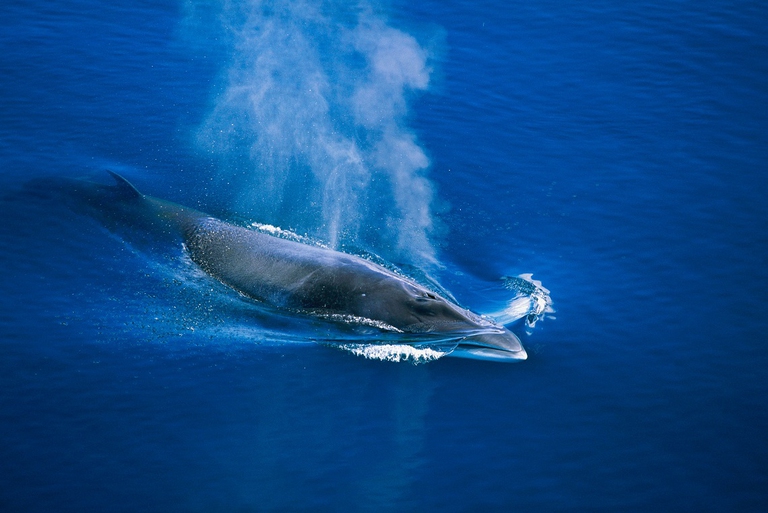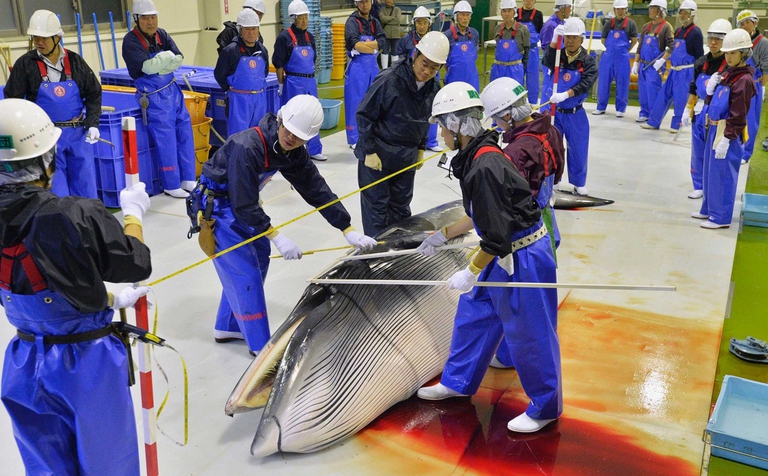
A group of experts in Tokyo suggested pouring radioactive water from Fukushima into the open sea. A marine biochemist explains the consequences of this absurd decision.
Il Giappone ha annunciato la ripresa della caccia ai cetacei nell’Antartico per “scopi scientifici”. Nei prossimi dodici anni saranno uccise circa 4mila balenottere.
Once again, Japan challenges the world. After the 1-year hiatus, the first Japanese fleet has departed on 1 December, headed to the Antarctic, in search of whales. Whaling will last until March and four whalers will be employed.
In response to all protests sparked, Tokyo has declared it has reduced by two third the number of whales to be killed: “only” 333 cetaceans will be victim of the Japanese harpoons. Japan, alongside Iceland, Norway, and Faroe Islands, is the only country to not stop whaling, and has deliberately ignored the ban on hunting of the International Court of Justiceale.
The ban comes after that Australia denounced Japan of hunting in its exclusive economic zone extending for 200 nautical miles from its Antarctic territory. Hunting for commercial purposes, according to a moratorium of the International Whaling Commission (IWC), is illegal since 1986. However, Japan appealed to the only loophole possible to continue whaling: the hunt for scientific purposes.
But in 2014 the International Court of Justice said Japan’s Antarctic hunt was not scientific and should cease. Therefore, the decision of starting whaling again, besides being immoral, is unlawful. “We do not accept in any way, shape or form the concept of killing whales for so-called scientific research,” said Greg Hunt, Australia’s minister for the environment. “Japan cannot decide unilaterally”.
In support of its initiative, Japan has provided a 12-year research programme to the IWC, by pledging to publish all results. In 12 years, 4,000 whales will be killed. However, the IWC has reaffirmed the scientific inconsistency of Japan’s programme, and did not authorised whaling.
Japan’s government, which did not previously recognise Australia’s sovereignty on Antarctic waters, has in response announced to the United Nations that it will not accept the International Court of Justice’s jurisdiction or any interference on its use of marine resources.
Nick McKim, senator of the Australian Greens, has asked the government to raise the issue of whaling at the climate conference in Paris, COP21. “It is beyond time just for words,” McKim said. “It is time for action and that’s why we need a boat down there gathering evidence against Japan for future court cases.”
Siamo anche su WhatsApp. Segui il canale ufficiale LifeGate per restare aggiornata, aggiornato sulle ultime notizie e sulle nostre attività.
![]()
Quest'opera è distribuita con Licenza Creative Commons Attribuzione - Non commerciale - Non opere derivate 4.0 Internazionale.
A group of experts in Tokyo suggested pouring radioactive water from Fukushima into the open sea. A marine biochemist explains the consequences of this absurd decision.
The decline in grey and humpback whales in the Pacific and Atlantic Oceans has been traced to food shortages caused by rising ocean temperatures.
The United Nations has launched a major international alliance for ocean science, undertaking a mission close to all our hearts.
The cargo ship that ran aground off the coast of Mauritius on 25 July, causing incalculable damage, has split in two and its captain has been arrested.
The largest coral reef in the world is severely threatened by climate change, but researchers are developing strategies that could contribute to saving the Great Barrier Reef.
Seychelles have extended its marine protected area, which now covers over 400,000 square kilometres, an area larger than Germany.
Norwegian oil giant Equinor had pulled out of drilling for oil in the Great Australian Bight, one of the country’s most uncontaminated areas. A victory for activists and surfers who are now campaigning for the area to be protected forever.
30 per cent of the planet needs to be protected to stop precipitous species decline. The UN has set out its aims for the the COP15 on biodiversity scheduled for Kunming, China in October.
Ocean warming has risen to record highs over the last five years: just in 2019 the heat released into the world’s oceans was equivalent to that of 5-6 atomic bombs per second. The culprit, no doubt, is climate change.










